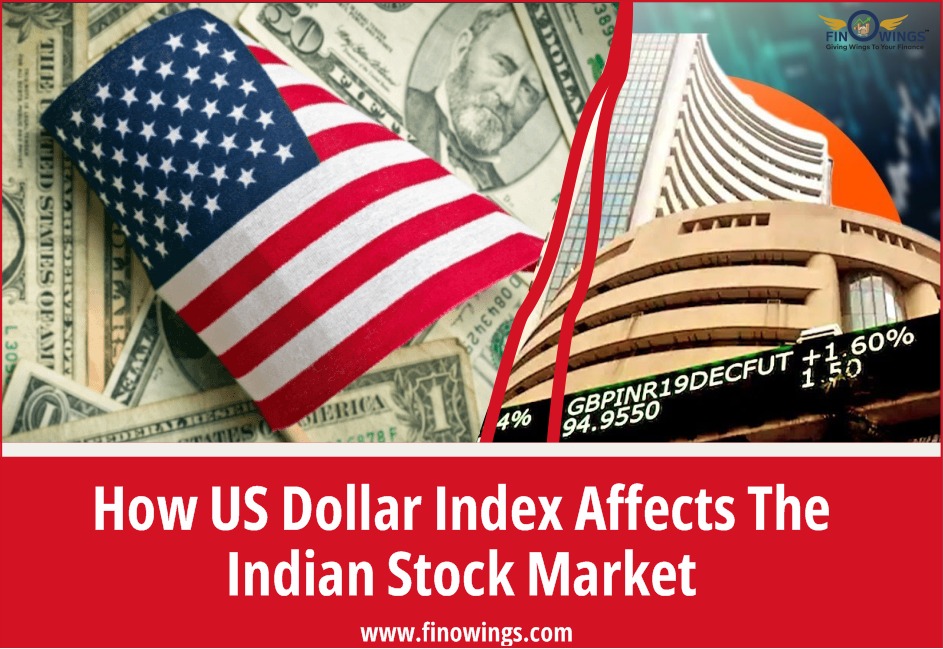Home >> Blog >> How US Dollar Index Affects the Indian Stock Market
How US Dollar Index Affects the Indian Stock Market

Table of Contents
Introduction
The financial world is interconnected in fascinating ways, and one such connection that has a substantial influence on the Indian stock market is the relationship between the US Dollar Index (USDX) and India's financial landscape. In this blog, we will delve into this intricate connection, explaining how fluctuations in the US Dollar Index can shape the performance of the Indian stock market and what it means for investors. Let's unravel this relationship step by step.
Understanding the US Dollar Index (USDX)
Before we delve into how the US Dollar Index affects the Indian stock market, let's grasp what the USDX is all about. The US Dollar Index measures the value of the US dollar in comparison to a basket of major international currencies, including the euro, Japanese yen, British pound, Canadian dollar, Swedish krona, and Swiss franc. It offers insights into the relative strength or weakness of the US dollar on the global stage.
Detailed Video
How It Influences the Indian Stock Market
1. Exchange Rates and Exports:
When the US Dollar Index rises, it typically leads to a weaker Indian Rupee (INR) against the US dollar. A weaker INR means that it takes more rupees to buy one US dollar. This can have a positive impact on Indian exports. A weaker INR makes Indian products and services more competitively priced in international markets, potentially leading to increased revenue and profitability for Indian companies engaged in exporting. Consequently, this can drive up the stock prices of these export-oriented firms.
2. Foreign Institutional Investment (FII):
Foreign investors, often referred to as Foreign Institutional Investors (FIIs), play a significant role in the Indian stock market. When the US Dollar Index strengthens, foreign investors might find Indian investments more appealing due to favorable exchange rates. A stronger US dollar allows them to get more Indian Rupees when converting their dollars. This can result in increased foreign institutional investment in the Indian stock market, which can stimulate demand for Indian stocks and boost stock prices.
3. Oil Prices and India's Current Account:
Oil is globally priced in US dollars. A stronger US Dollar Index can exert downward pressure on oil prices in dollar terms. As India is a major importer of oil, lower oil prices, when measured in dollars, can translate into cost savings for the country. Reduced expenses in importing oil can help reduce India's current account deficit, a measure of the money flowing into and out of the country. A smaller deficit can contribute to economic stability and, subsequently, positively impact the stock market.
4. Inflation and Interest Rates:
The strength of the US dollar can influence inflation and interest rates in India. A robust US dollar can lead to lower global commodity prices. Reduced commodity prices can contribute to lower inflation in India. Lower inflation can provide leeway for India's central bank to consider reducing interest rates, which can be favorable for businesses and investors, as lower interest rates can make borrowing and investments more attractive.
5. Global Market Sentiment:
Fluctuations in the US Dollar Index can influence global market sentiment. A stronger US dollar is often viewed as a sign of a healthy US economy, which can have a positive impact on global markets, including the Indian stock market. Positive sentiment can encourage investors to be more optimistic, potentially leading to increased investments in Indian stocks.
Conclusion
The relationship between the US Dollar Index and the Indian stock market is intricate and multi-dimensional. Changes in the US Dollar Index can influence exchange rates, foreign institutional investment, oil prices, inflation, and market sentiment in India. As a result, investors should pay close attention to the US Dollar Index, as it can provide valuable insights into the future direction of the Indian stock market. Understanding this connection can help investors make more informed decisions and navigate the ever-evolving landscape of finance.
Whether you're an experienced investor or just curious about financial dynamics, remember that the US Dollar Index isn't merely about currency values; it's a key to understanding how the global financial puzzle fits together and how it affects the Indian stock market. Stay tuned for more insightful articles on finance and investment!
Author
Frequently Asked Questions
The US Dollar Index (USDX) is a measure of the value of the US dollar compared to a basket of major international currencies. It helps us understand how the US dollar is performing relative to other global currencies.
When the US Dollar Index strengthens, it often leads to a weaker Indian Rupee (INR) against the US dollar. This means it takes more INR to buy one US dollar, affecting exchange rates between the two currencies.
A weaker Indian Rupee makes Indian products and services more competitively priced in international markets. This can boost revenue for Indian companies engaged in exporting, as foreign buyers find Indian goods more affordable.
A stronger US dollar can make Indian investments more attractive for foreign investors. When converting their dollars into Indian Rupees, they can get more for their money, potentially leading to increased foreign institutional investment in the Indian stock market.
Oil is globally priced in US dollars. A stronger US Dollar Index can lead to lower oil prices in dollar terms. As India is a major oil importer, lower oil prices can reduce India's expenses for importing oil, positively impacting its economy.
A stronger US dollar can lead to lower global commodity prices, including oil. Reduced commodity prices can result in lower inflation in India. Lower inflation can provide the central bank with an opportunity to consider reducing interest rates, making borrowing and investments more attractive.

















